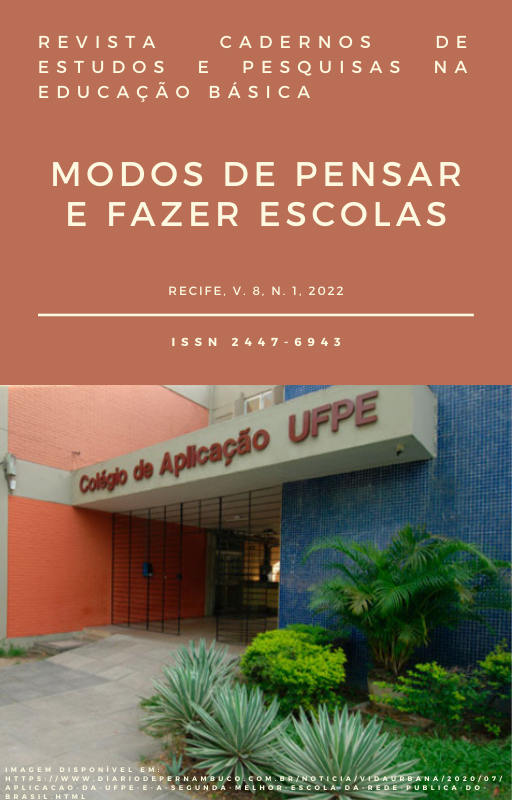The Importance Of Knowledge Of Attention Deficit And Hyperactivity Disorder (ADHD) In Early Childhood Education For The Development Of Appropriate Learning
Keywords:
ADHD, early childhood education teachers, educationAbstract
This article sought to identify what Early Childhood Education (EI) teachers understand about Attention Deficit Disorder/ADHD, emphasizing the importance of knowing this disorder, its negative aspects of
learning so that they can develop an appropriate activity for each child. For this, we define ADHD, explain
its symptoms, and its impacts on learning, followed by a qualitative research carried out through a bibliographic research linked to a directed interview conducted with early childhood education teachers, seeking to know what they understand about this disorder and what their implications for learning. Based on what was collected, we seek to clarify concepts in order to elucidate doubts and also to show the EI teachers how important it is to know about this disorder in order to perform their work in the classroom
so that they can serve each student properly.
References
American Psychiatric Association (APA). Manual diagnóstico e estatístico de
transtornos mentais – DSM 5. M. I. C. 5ª ed. Porto Alegre: Artmed [internet].
BOSSA, Nádia Aparecida. Dificuldades de aprendizagem: o que são? Como tratalas? Porto Alegre: Artes Médicas Sul, 2000.
BRASIL. Base Nacional Comum Curricular. Brasília: Ministério da Educação, 2017.
Disponível em:
http://basenacionalcomum.mec.gov.br/images/BNCC_EI_EF_110518_versaofinal_site.pdf>. Acesso em: 25/05/2021.
BRASIL. Projeto de Lei nº 7081/2010. Dispõe sobre o diagnóstico e o tratamento da dislexia e do Transtorno do Deficit de Atenção com Hiperatividade na educação
básica. Brasília: Senado Federal, 2010. Disponível em:
https://www.camara.leg.br/proposicoesWeb/prop_mostrarintegra;jsessionid=node0lupm8uoydshl4xnpo7ap6hb79686293.node0codteor=752565&filename=PL+7081/2010>. Acesso em: 20 out. 2020
BRASIL. Lei nº 9.394, de 20 de dezembro de 1996. Estabelece as Diretrizes e Bases
da Educação Nacional. Brasília: Presidência da República. Disponível em:
http://www.planalto.gov.br/ccivil_03/leis/L9394compilado.htm>. Acesso em: 20 out.2020.
CAMARGO, Walter Júnior.; HOUNIE, Ana G. Manual Clínico do Transtorno de
Déficit de Atenção e Hiperatividade. Minas Gerais: editora Info Ltda., 2005.
FREIRE, Paulo Professora sim, tia não: cartas a quem ousa ensinar. São Paulo:
Olho d’água, 1993. _. A importância do ato de ler, 1993.
GRAY, Alice. História para o coração do professor. Organizado por Alice Gray;
(Tradução de Maria Emília de Oliveira). São Paulo: Hagnos; 2004.
MINAYO, Maria Cecília de Souza (org.). Pesquisa social: teoria, método e
criatividade. 29. ed. Petrópolis, RJ: Vozes, 2010.
NASCIMENTO, Maria Inês Corrêa, et al. Manual Diagnóstico e Estatístico de
Transtornos Mentais: DSM-5. 5ª Edição. Porto Alegre: Artmed, 2014.
ROTTA, Newra Tellechea; OHWEILER, LYgia; RIESGO, Rudimar dos Santos.
Transtornos da Aprendizagem: abordagem neurobiológica e multidisciplinar.
ªEdição. Porto Alegre: Artmed, 2016.
SILVA, Ana Beatriz Barbosa. Mentes inquietas: TDAH: desatenção, hiperatividade e
impulsividade. São Paulo: Globo, 2014.
THIOLLENT, Michel. Crítica metodológica, investigação social e enquete
operária. 5a ed. São Paulo: Polis; 1987.
TARDIF, Maurice. Saberes Docentes e Formação Profissional. 17a ed. Petrópolis,
RJ: Vozes; 2014.
Downloads
Published
Issue
Section
License
Copyright (c) 2022 Cadernos de Estudos e Pesquisa na Educação Básica

This work is licensed under a Creative Commons Attribution 4.0 International License.
CARTA DE AUTORIZAÇÃO PARA PUBLICAÇÃO ON LINE
CONCESSÃO DE DIREITOS AUTORAIS
O(s) autor(es) do trabalho acadêmico enviado à Revista CADERNOS DE ESTUDOS E PESQUISA NA EDUCAÇÃO BÁSICA CAp-UFPE, por ser(em) titular(es) da propriedade literária do mesmo, assume(m) integral responsabilidade diante de terceiros, quer de natureza moral ou patrimonial, em razão de seu conteúdo, declarando desde já, que a obra a ser entregue é original, e que não infringe quaisquer direitos de propriedade intelectual de terceiros e, caso infrinja, as devidas responsabilidades legais relacionadas a Direitos Autorais do material recaem sobre o(s) autor(es) do texto em questão. Desta forma, autoriza(m) a edição de seu trabalho e concede(m) à Revista CADERNOS DE ESTUDOS E PESQUISA NA EDUCAÇÃO BÁSICA CAp-UFPE permissão para reproduzir, comercializar, editar e publicar o citado artigo impresso em papel ou on line, na referida Revista em número e volume ainda a serem definidos pela sua Comissão Editorial. Tal concessão não terá caráter oneroso para a UFPE ou para a Comissão Editorial da Revista CADERNOS DE ESTUDOS E PESQUISA NA EDUCAÇÃO BÁSICA, ou seja, não haverá remuneração sob qualquer modalidade pela utilização do referido material, tendo o mesmo o caráter de colaboração. O(s) autor(es) compromete(m)-se a assegurar o uso e gozo da obra à Revista CADERNOS DE ESTUDOS E PESQUISAS NA EDUCAÇÃO BÁSICA, que poderá explorá-la com exclusividade nas edições que fizer e compromete(m)-se também a não autorizar(em) terceiros a transcreverem ou traduzirem parte ou totalidade da obra sem expressa autorização da Comissão Editorial desta Revista, cabendo ao infrator as penas da legislação em vigor. O(s) autor(es) asseguram ainda que revisou(aram) a forma final do trabalho e o aprovou(aram) para publicação. À Revista CADERNOS DE ESTUDOS E PESQUISA NA EDUCAÇÃO BÁSICA – Comissão Editorial, reserva-se o direito de modificar o texto, em consulta ao/a/aos/as autor/es/a/as, incluindo reformulações na linguagem, quando necessário, sem prejudicar seu conteúdo, com o objetivo de uniformizar a apresentação.
Os conteúdos da Revista Cadernos de Estudos e Pesquisa na Educação Básica estão licenciados com uma Licença Creative Commons Atribuição 4.0 Internacional.


